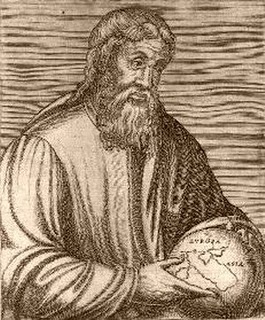PYTHEAS – THE GREEK EXPLORER WHO DISCOVERED BRITAIN
Pytheas of Massalia (350-285 BCE) was a renowned navigator and explorer who lived in Greek colony which is now known as ‘Marseille’ and forms part of Southern France. The Greeks had many colonies outside of Greece and formed a presence all over the Mediterranean, and including such places as Italy, France, Spain, Turkey, Russia and North Africa. Greeks spread-out due to over-crowding, lack of resources, warfare and sometimes banishment, and took their sophisticated culture with them. No matter where a Greek was born, he or she was considered a ‘Greek’ first and foremost. As the Greek culture involved the use of logical thought applied to the divine and worldly realm, the exploration (and mapping) of the world was an important element of the development of Greek knowledge. This exploration by land and sea often involved navigation by the stars, and the understanding of the behaviour of the earth and the sun, etc, as well as predicting weather, climate and the rhythms of the sea. The Greek cultural influence throughout the world they occupied not only formed the basis for the Latin alphabet (together with Etruscan influence) and contributed (through Roman culture) to the development of European culture.
In around 304 BCE Pytheas set sail from Massalia with the intention of exploring the seas west of the European landmass. In so doing Pytheas became the first Greek to visit and sail around Britain. He discovered that Ireland lay further west of Britain, and that Norway was to the north of Britain. Not only this, but Pytheas is said to have landed in Cornwall and witnessed their tin-mining industry, and travelled all around the island nation. He said that the British were friendly and hospitable and although there were many different kings and leaders, peace reigned throughout the land. Pytheas stated: ‘The people of Britannia are simple in their habits and far removed from the cunning knavishness of modern man… they do not drink wine, but a fermented liquor made from barley, which they call curmi.’ His circumnavigation of Britain took six years to complete which included time taken landing ad investigating various places. The books of Pytheas entitled ‘The Ocean’ and ‘A Description of the Ocean’ are now lost – but much of his work has been preserved in the writings of others. Oddly, Pytheas spent much of his life trying to convince his incredulous contemporaries that he had indeed really discovered Britannia – as many were of the opinion that nothing existed west of the European mainland. It can be said today that Pytheas was the man who discovered Britain!
 RSS Feed
RSS Feed













 March 19th, 2024
March 19th, 2024  Awake Goy
Awake Goy 
 Posted in
Posted in  Tags:
Tags: 
















